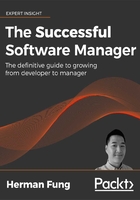
The interview and the offer
Perhaps you think you're ready, or perhaps you're not quite, but want to try it anyway.
To best illustrate this part, let's say it's an external position with another organization that you are going for, because that's likely to include all of the aspects of the internal option, with a bit of extra process and rigor.
When you are invited to an interview for a manager vacancy, there are a lot of different ways that the interview can go. But before you get to the interview itself, there are several things you should think about.
First, you should be clear on the type of manager role it is. Increasingly, the manager role is becoming more diverse and hybrid. Such a role usually includes elements of team, development, and project management all mixed in. It's always good to be clear on what this mix is, so that you can assess your own preference and tailor your approach accordingly.
Tailoring your approach, in this respect, means highlighting particular skills and experiences, which are most applicable to the type of role, and what the hiring manager is looking for.
For a team manager, it's likely to have large elements of people management, including a healthy dose of sensibility toward people in general. For a development manager, it could be technical design and hands-on solution delivery. For a project manager, it could be stakeholder management, budgeting, and general organization skills.
Secondly, remember to position and represent yourself as a manager, not a developer. Yes, you are still a developer until you get this job. However, you should fast-forward slightly and think like a manager in answering the questions, especially if they are more hypothetical. If it's more experience-based, such as "Tell me about a time when...", then draw on your learnings from all the managerial responsibilities that you already do, as an accidental manager or when you deliberately volunteered for management tasks, as well as what you learned from shadowing, or your mentoring sessions.
Be super confident in your top six manager skills and remain confident if there are any follow-up or probing questions. This is good practice and an essential demonstration of your behavior as a manager, because a manager is likely to be challenged regularly on various grounds in the real world, sometimes reasonably, and sometimes not. How you react to being challenged is an answer itself, which an insightful interviewer will be looking for.
Think about the value of your Developer-to-Manager transition for the organization, rather than yourself. Incorporate the fact that you are a brilliant developer, which helps you to manage a team of developers or a development project.
On the more practical matters, there are typically three main themes in terms of interview content:
- Overview and discussion on your résumé and experience
- Competency-based questions
- Presentation on a pre-determined topic
These are not wildly different from most interviews for any role, perhaps with the exception of the presentation. The topic and guidelines may be given to you in advance of the interview, or you could just be given 10 minutes to prepare as part of the interview itself.
If you are not comfortable with presenting, which is true for a lot of people, then make sure you get help from trusted colleagues and your mentor. Practice the presentation with them and get their honest feedback. Again, think and practice as a manager.
Finally, after you have had a great discussion with the hiring manager, do not be put off if you are offered the job with certain conditions, including an immediate development plan to address your lack of experience as a manager. This is very positive because it indicates they are willing to invest in you as an individual. It will give you the necessary support to learn, which you will inevitably have to do.